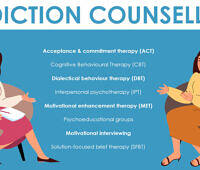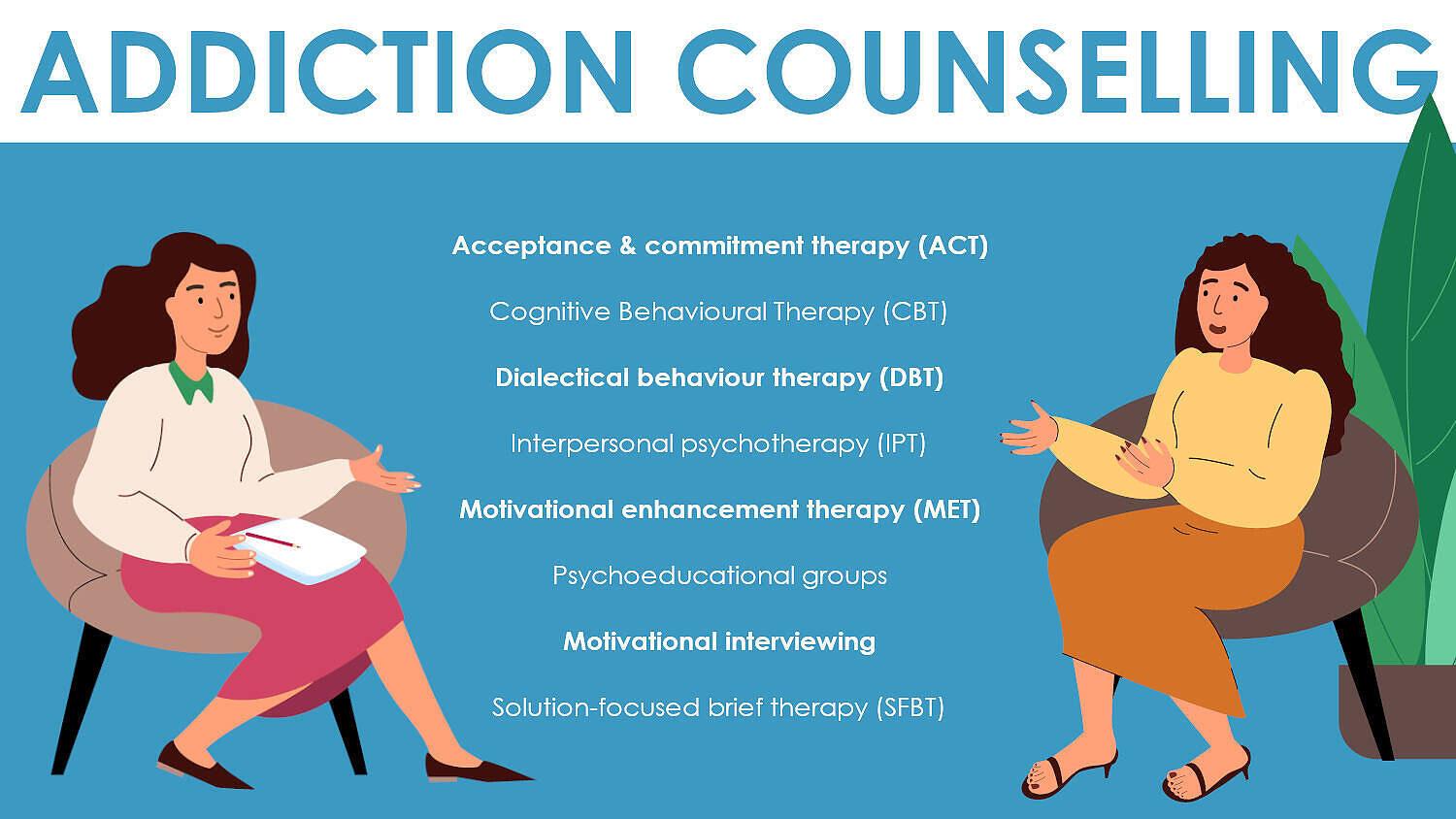
Addiction Counselling
The goal of addiction counselling is primarily to help a person deal with cravings and cope with triggers.
Working with clients who struggle with addictions raises many questions. Why do people carry on with a behaviour that eventually causes so much pain and damage? Why is relapse so common?
Addiction counselling aims to explore these questions and arrive at effective solutions to curbing addictive behaviour.

Be Choosy
Choosing a substance abuse counsellor is like choosing a partner or spouse; you don’t just pick anyone you see on the street. You find the right one for you, and then take the time to get to know each other and begin moving forward. Obviously, you are not marrying your therapist, but you will talk to them about many personal aspects of your life. You will want to have someone you feel comfortable with, and you trust. Try to talk with them on the phone first before making that appointment and getting a feel for them. What does your gut say? If you feel like this is a good fit, then go ahead to the next step, but if something seems like this is not a good fit, start looking for someone else.
Ask Questions
It is okay to ask questions about your therapist’s skill, understanding and background with whatever you are dealing with. Get details upfront. Ask about billing and how this will be paid so there are no surprises when you are in session. If this is someone who has never even heard of your specific issue before, then you should move along. If you cannot afford it, or it would be a stretch for your budget, find someone else. If you try to make it work, you will make a couple of sessions before finances and stress catch up with you, and then you will see that therapist fewer and fewer times until you stop going.
Honesty is the Best Policy
This cannot be said enough: you need to be honest with your alcohol counsellor so they can help you. Most likely, they have heard worse that day anyway. Therapists and counsellors are also bound by ethical and legal codes that prevent them from even acknowledging you are a client of theirs, let alone what specific things you say, so they will not be divulging this to others. There would be severe consequences for them if they did. For counselling and therapy for alcohol, a person may be dealing with a tremendous sense of shame and guilt, which often leads to deception or half-truths. Therapists understand this and want to help you achieve addiction recovery. They will not make you feel any worse than you already do about yourself; in fact, they want you to feel better.
They need your help and honesty to help you because they do not know you yet; only you know what is going on in your head and heart. Only you know your history. Only you can help find the root cause of the problems for which you are seeking help. If they do not have the correct or complete information, they may misdiagnose you and provide the wrong suggestions based on that diagnosis.
Imagine it this way: if you went to a counsellor but were too scared to admit to your counsellor that you were anxious and fearful because you were having suicidal thoughts. They would know about the anxiety and work with you on that, not the suicidal thoughts, which were the more important problem. They would still be there, and you would see therapy as a failure. You need to be honest with your therapist about everything going on and troubling you to get the most out of therapy.
Therapy sessions within the confines of a rehabilitation centre will be in a comfortable and secure environment. Issues are communicated in utter confidence. All counsellors are subject to strict professional codes of confidentiality.
Alcohol addiction counselling typically lasts for a week or two following the completion of detoxification. Once patients leave the centre, they receive after-care treatment, normally for 12 months, following the completion of rehabilitation. We encourage patients to engage local Alcoholics Anonymous groups upon their return home.
Setting Goals for Addiction Counselling
Make sure you set goals for yourself in therapy. The reason behind this one is simple: how will you know when you have improved without a goal for improvement? Make reasonable ones with your therapist. They will have a general sense of how specific issues are to be treated, so let them help guide you with goals and a timeframe.
Most Important Things First
Along with setting goals, select the issues that need to be handled first. Again, listen to your therapist’s advice on this, but you know what is most distressing for you. Every day you have to live with the thoughts and feelings that bring you to a therapist, so which are the most troubling, and which can you tolerate the least? That should be your beginning point for what to take on first. There may be times to treat things concurrently or to go for lesser troubling matters first. This usually happens in cases where people are dealing with addiction. Handling addiction may be about getting them off drugs or alcohol as part of the major goals so they are clear-headed enough to talk about why they started using in the first place.
What counselling for addiction is used to Treat
- Drug Addiction
- Sex and Love Addiction
- Alcohol Addiction
- Internet Addiction
- Counselling for Gaming Addiction
- Gambling addiction
- Eating Disorders
- Shopping Addiction
How Does Counselling Help in Addiction Recovery?
Drug and alcohol counselling is the umbrella term for a variety of different therapies, so your recovery programme is likely to include a number of these. Your rehab provider will assess your situation and personal circumstances to decide on the best drug counselling techniques. However, all have the same aim: to get to the root of your addictive behaviour and to help you change the negative thoughts and processes that have held you in the grip of addiction for so long.
Along with detoxification, counselling is a vital component of an alcohol rehab programme. Alcohol addiction counselling takes place once the initial detox programmes conclude.
Both individual and group drug addiction counselling are used to treat a variety of addictions. Individual counselling can help you deal with withdrawal symptoms or get to the cause of your own problems. You will work closely with a counsellor to talk about issues that are personal to you. Counselling will help you realise that talking about things can be therapeutic and help you get better.
This is a regular part of treatment and should be done to give yourself the best chance to succeed. This can be things like talking to someone who is giving you anxiety, keeping a journal, or sometimes it’s simply doing something to pamper yourself. Examining what happened, how it worked, and what didn’t work is a strong part of therapy so that you can figure out the best treatment approaches that work for you and your needs.
Therapy and addiction counselling can be an investment in time and money for recovering addicts, and the outcome is well worth it when you are less stressed and able to deal with life without harmful habits. Considering the investment needed, it is wise to look at it to get the most out of it and have the best chances for success. These tips will put you on the path towards a wonderful therapeutic alliance and healthier life ahead of you.
Detox Plus UK can offer referrals to trained therapists and alcohol abuse counsellors who specialise in addiction treatment and addiction counselling in London. However, we will find an alcohol counsellor near you in your own area for those looking to stay closer to home.
Contact Us to find out how we can help you make the right choice for you and your loved ones to help your emotional health recovery in line with your addiction treatments.
Types of addiction therapy
The core of addiction treatment revolves around therapy, and various therapeutic approaches and models have been utilized in addiction treatment.
Different facilities have unique methods, so it is essential to consider the therapy models they provide before selecting a facility.
Mental health assessment
Understanding the extent and nature of someone’s substance use disorder and its interaction with other life areas is essential for careful diagnosis, appropriate case management, and successful addiction treatment.
This understanding begins during the assessment process, which helps match the client with appropriate treatment services. This could mean matching a client with an addiction and a psychiatric condition to a more appropriate rehabilitation service.
Acceptance and commitment therapy (ACT)
Acceptance and commitment therapy (ACT) aims to promote emotional resilience.
ACT is a form of therapy that combines acceptance, mindfulness, commitment, and behavioural change techniques to enhance psychological adaptability.
ACT does not seek to eliminate negative emotions and thoughts. Instead, it encourages individuals to embrace and effectively handle uncomfortable feelings without avoiding situations that may trigger them.
Cognitive Behavioural Therapy (CBT)
Cognitive Behavioural Therapy (CBT) aims to enhance psychological well-being by confronting and transforming pessimistic thoughts and behaviours.
The therapist collaborates with the client to identify efficient methods for managing addiction and triggers while also imparting new skills in information processing that can assist the client in adapting to life following treatment.
Dialectical behaviour therapy (DBT)
Dialectical behaviour therapy is an adapted version of cognitive behavioural therapy that incorporates traditional techniques along with principles like mindfulness, acceptance, and dealing with distress, which is rooted in specific Buddhist traditions.
The goal of DBT is to empower the individual to shape and ultimately accomplish a fulfilling existence.
Interpersonal psychotherapy (IPT)
Interpersonal psychotherapy (IPT) is a therapeutic approach that emphasizes the importance of connections and addresses relationship difficulties.
It recognizes that our interactions and experiences with others influence our emotions and vice versa. IPT aims to enhance clients’ ability to communicate and engage in relationships while also building a network of supportive individuals who can aid them in overcoming obstacles encountered during their healing process.
Motivational enhancement therapy (MET)
Motivational enhancement therapy utilizes motivational interviewing to examine the substance of client meetings, to equip clients with abundant knowledge to help them attain their objectives and cultivate a more wholesome mindset.
MET does not intend to steer clients through the recovery process but rather to instigate internal transformation that can facilitate a more optimistic approach towards recovery.
Psychoeducational groups
Psychoeducational group therapy utilizes CBT principles to educate individuals about their alcohol use disorders and methods for managing them.
The group discusses rational thinking, acquiring new skills, exposure to triggers, and preventing relapse.
Motivational interviewing
Motivational interviewing is a counselling method that focuses on the needs and goals of the client, aiming to encourage changes in behaviour by addressing inner conflicts.
It emphasizes understanding rather than judgment and involves therapists being more proactive than conventional therapeutic approaches.
Solution-focused brief therapy (SFBT)
Solution-focused brief therapy (SFBT) is a therapeutic method that prioritizes finding solutions instead of dwelling on problems.
Individuals are encouraged to re-evaluate past approaches to tackling life’s difficulties and understand why they didn’t work to create new, more fitting solutions that align with their circumstances and personalities.

